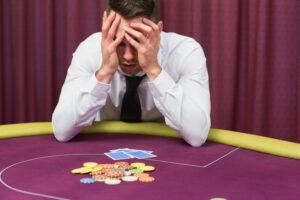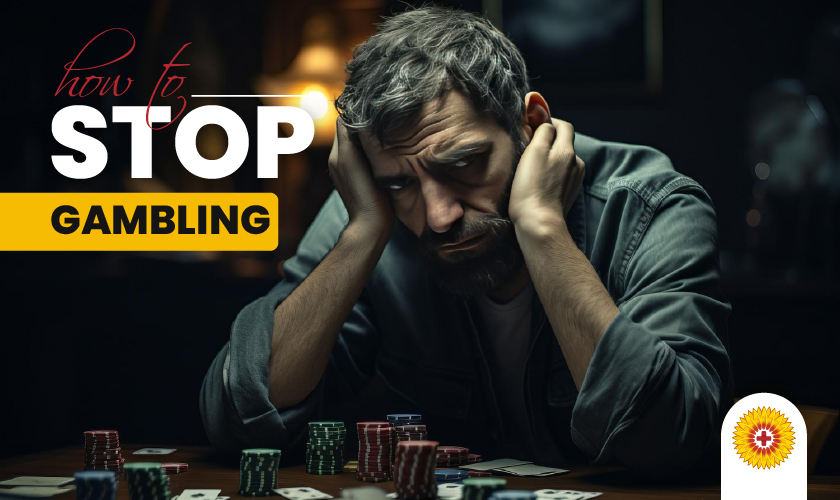Gambling is betting or putting money on an event with undefined results to win more money.
Participating in any action where a person uses money, eager to win further, is considered gambling.
It is an addiction referred to as a “hidden illness.” There are no physical signs like drug or alcohol addiction.
Keep reading to learn how to stop gambling and search for support for yourself or your loved one.
Gambling Addiction
Gambling addiction is a type of condition in which a person tries to seek money through unknown resources, such as by winning games or betting on some good.
People with gambling disorders often hide their behavior.
Similarly, there are threatening signs that gambling has become problematic for somebody you know.
People with gambling issues may face financial difficulties. Signs of financial trouble include:
- Borrowing money frequently.
- Having numerous loans.
- Unpaid bills.
- Lack of food and domestic essentials.
- Missing money or domestic goods.
To get further support, contact us today for a better life ahead.
Signs and Symptoms of Gambling

Signs and symptoms of gambling can include:
- Being constantly involved in gambling activities and thinking about how to get more money.
- Requiring to gamble with collective amounts of money to get the same excitement.
- Trying to make more money without success and effort.
- Feeling fidgety or useless when you try to reduce the gambling addiction.
- Gambling to escape problems or relieve feelings of vulnerability, blame, anxiety, or unhappiness.
- Trying to acquire lost money by gambling.
- Lying to family members or others for the sake of your gambling.
- Risking or losing meaningful relationships, a job, or better opportunities due to gambling addiction.
- Asking others to take you out of financial trouble because you lost the gambled money anyway.
Myths and Facts about Gambling
| Myths | Facts |
| If I keep gambling, my luck will change, and I’ll win back the lost money. | Each time you place a bet, the outcome is entirely independent of the previous one. |
| I almost won; I must be due for a win. | Almost winning doesn’t mean a real win is imminent. Future gambling outcomes are uninfluenced by previous results. |
| Online betting apps and sports betting sites are all the same. | Some gambling sites and apps are licensed, while others aren’t. |
| If I play multiple slot machines or poker games simultaneously, I’ll increase my chances of winning. | While you may win more often by playing multiple games simultaneously, you’ll also spend more and ultimately lose more. |
| Today is my lucky day; I know I’m going to win. | Hoping or wishing to win has no impact on the outcome of a game of chance. |
How to Stop Gambling? – 7 Helpful Tips
- Manage Your Moods
- Join Online Peer Support Forums
- Widen Your Social Circle
- Ask Loved Ones for Support
- Find Replacement Activities
- Block Gambling Transactions
- Consider Self-Exclusion
Additional Resources:
Strategies for Change
Set goals.
Setting short-term and long-term goals may help you to stay attentive and clear about giving up gambling.
Talk about it.
The conversation about gambling with somebody you trust and someone who won’t judge you can comfort the pain of letting it up.
It can also lessen the stress that can cause you to continue to gamble.
Avoid high-risk situations.
The use of credit cards, borrowing money, taking large amounts of cash with you, using gaming sites for socialization, or gambling as a reaction to feelings.
These behaviors will decline your tenacity to control or stop your gambling.
Find alternatives to gambling.
There are two significant risk aspects of why people continue to gamble:
- Social isolation.
- Leisure substitution.
When people stop gambling, they lack the inspiration to find other thrilling and fun activities.
Moreover, they lose family and friends who could support them in such actions.
In A Nutshell
Gambling affects family dynamics and creates an unnatural environment.
In such a situation, the family members can’t trust that person and try to avoid any unusual event.
At that point, everyone is fed up with deceitful behavior and lies and has no assurance in fixing the relationship.
However, a person with a gambling addiction must require a robust support system to reduce it.
No matter where you are in your addiction recovery, there is help available.
If you or someone you know is experiencing mental health concerns, reach out to us at Urgent Care of Kansas.
FAQs
How much do gamblers lose?
The average loss created by a man addicted to gambling is between $55,000 and $90,000. Women gamblers lose the amount an average of $15,000 in debt.
Does gambling run in families?
Gambling disorder appears to run in families. Factors such as social inequality and trauma, mainly in women, can be risk factors.
How many types of gambling are there?
Gambling comes in various forms. Commercial gambling includes:
- Lotteries.
- Instant lotteries.
- Sports betting.
- Horse betting.
- Poker and other card games.
- Casino table games.
- Bingo.
Do gamblers feel guilty?
Yes, at some point, the gamblers feel guilty, too. There are other feelings, too, like stress and regret, which most people sense at some point, even if only fleetingly.
It’s easy to overlook this side of gambling, but these moods often build up, even if you’re not gambling very much or very often.



No comment